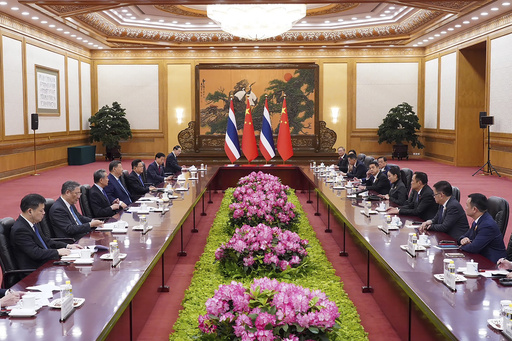
BANGKOK — During a meeting in Beijing on Thursday, Chinese President Xi Jinping and Thai Prime Minister Paetongtarn Shinawatra expressed their commitment to combat the scam networks afflicting Southeast Asia. The discussion took place against a backdrop of increasing online scams originating from neighboring countries such as Myanmar, Cambodia, and Laos. These countries have become hubs for deceptive operations that lure individuals with fake job offers, leading them to secret locations where criminal groups exploit them for fraudulent work that targets victims globally.
Thailand’s image has been tarnished by several high-profile incidents involving Chinese nationals who were misled into working in Bangkok, only to be trafficked to scam operations in Myanmar. Recent cases, including that of Chinese actor Wang Xing, highlight the ongoing issue. In response, Thai and Chinese authorities have initiated measures to tackle the scam problem, including a visit from Liu Zhongyi, China’s vice minister of public security, to the border area.
President Xi acknowledged Thailand’s vigorous efforts to address online gambling fraud, stating that both nations must enhance their law enforcement, security, and judicial collaboration. Prime Minister Paetongtarn supported this sentiment, affirming Thailand’s willingness to deepen cooperation with China and neighboring countries to effectively fight cross-border crimes like online fraud and scams.
In a prelude to her visit, Thailand took measures to cut off electricity in certain border regions of Myanmar to disrupt the operations of scam compounds. However, the effectiveness of this action remains uncertain, as many of these compounds are equipped with their own power generators.
This trip marked Paetongtarn’s inaugural visit to China as prime minister and coincides with the 50th anniversary of diplomatic relations between the two nations. During the discussions, Xi offered to collaborate on a new railway project linking Thailand and China. Recently, Thailand sanctioned a $10 billion railway initiative aimed at connecting Bangkok with the Laos-China high-speed railway. Additionally, they expressed hopes to enhance cooperation in the electric vehicle sector, which is gaining traction in Thailand as a market for Chinese automotive manufacturers.
China has historically been a major contributor to Thailand’s tourism, but the number of visitors from there has fallen to 6.7 million in 2024, in contrast to 11 million in 2019 prior to the coronavirus pandemic. Chinese tourists once comprised nearly a third of all arrivals.
Demonstrating a willingness to engage with Chinese interests, Prime Minister Paetongtarn’s administration made headlines in January when it deported a group of Uyghurs back to China. This decision came just before the two countries celebrated their 50-year diplomatic ties, amidst concerns over the treatment of the Uyghur community, a predominantly Muslim ethnic group facing persecution.
After the discussions in Beijing, Paetongtarn reiterated that Thailand “strongly” adheres to the one-China principle, affirming Beijing’s stance that Taiwan is a part of China.

